Submissions: 2021 April
Submissions: 2021 April
__________________________________________________________________________________________________
Please post your images here.
Please see this thread before posting images; posting images demonstrates your agreement with
the possible uses for your image.
If hotlinking to an image, please ensure it is under 500K.
Hotlinks to images over 500K slow down the thread too much and will be disabled.
Thank you!
_________________________________________________________________________________________________
<- Previous submissions
Please post your images here.
Please see this thread before posting images; posting images demonstrates your agreement with
the possible uses for your image.
If hotlinking to an image, please ensure it is under 500K.
Hotlinks to images over 500K slow down the thread too much and will be disabled.
Thank you!
_________________________________________________________________________________________________
<- Previous submissions
Know the quiet place within your heart and touch the rainbow of possibility; be
alive to the gentle breeze of communication, and please stop being such a jerk. — Garrison Keillor
alive to the gentle breeze of communication, and please stop being such a jerk. — Garrison Keillor
-
Paulee97
- Ensign
- Posts: 41
- Joined: Thu Sep 22, 2016 4:18 pm
- AKA: Paulee
- Location: Brno, Czech Republic
- Contact:
Re: Submissions: 2021 April

Lights fighting over Gran Canaria by Pavel Váňa
Natural (zodiacal light, airglow, Milky way, stars) lights fighting against unnatural lights (light pollution) over Gran Canaria.
Panorama made of 40 pics with each exposed for 15 s at ISO 8000. I used Canon EOS 6D modded with Sigma Art 24 mm f/1.4@2.8.
-
Paulee97
- Ensign
- Posts: 41
- Joined: Thu Sep 22, 2016 4:18 pm
- AKA: Paulee
- Location: Brno, Czech Republic
- Contact:
Re: Submissions: 2021 April
 Zodiacal light above the Iron curtain by Pavel Váňa
Zodiacal light above the Iron curtain by Pavel VáňaZodiacal light above remnants of The Iron curtain which was destroyed at the end of the Cold war.
This sentry tower with part of the Iron curtain can be found in Čížov in Podyjí national park, Czech Republic.
This panorama was made of 40 single shots with exposure time 15 seconds with Canon EOS 60D (baader mod) using ISO 3200. I used Sigma Art 18-35 f/1.8 lens.
-
Yovin Yahathugoda
- Ensign
- Posts: 21
- Joined: Tue Feb 09, 2021 2:56 pm
Re: Submissions: 2021 April
IC 1805 - Heart Nebula
https://www.astrobin.com/users/YovinRY/
Copyright: Yovin Yahathugoda
https://cdn.astrobin.com/thumbs/GlfsZPx ... UALzhf.jpg
Full quality version here: https://cdn.astrobin.com/images/86236/2 ... 2ebba6.jpg
Telescope - Takahashi FSQ-106 EDX4
Camera: FLI PL16803
Filters: Astrodon Ha 3nm, Astrodon OIII 3nm, Astrodon SII 3nm
Software: Photoshop 2020, PixInsight & Topaz Denoise AI
Location - IC Astronomy Observatory, Spain
Lum - Synthetic Luminance
Halpha - 34x600s, 24x300s
OIII - 25x600s, 24x300s
SII - 52x600s, 24x300s
Total Exposure time - 24.5 hours
Full acquisition details at https://www.astrobin.com/6yai7z/0/
https://www.astrobin.com/users/YovinRY/
Copyright: Yovin Yahathugoda
https://cdn.astrobin.com/thumbs/GlfsZPx ... UALzhf.jpg
Full quality version here: https://cdn.astrobin.com/images/86236/2 ... 2ebba6.jpg
Telescope - Takahashi FSQ-106 EDX4
Camera: FLI PL16803
Filters: Astrodon Ha 3nm, Astrodon OIII 3nm, Astrodon SII 3nm
Software: Photoshop 2020, PixInsight & Topaz Denoise AI
Location - IC Astronomy Observatory, Spain
Lum - Synthetic Luminance
Halpha - 34x600s, 24x300s
OIII - 25x600s, 24x300s
SII - 52x600s, 24x300s
Total Exposure time - 24.5 hours
Full acquisition details at https://www.astrobin.com/6yai7z/0/
Last edited by bystander on Fri Apr 02, 2021 4:36 pm, edited 2 times in total.
Reason: Please, no hot links to images > 500KB. Substituted smaller image,
Reason: Please, no hot links to images > 500KB. Substituted smaller image,
- Sergio
- Friendly Neighborhood Astrophotographer
- Posts: 100
- Joined: Mon Aug 29, 2011 5:26 pm
- Location: Buenos Aires, Argentina
- Contact:
Re: Submissions: 2021 April
NGC 362 - The forgotten Cluster
NGC 362 is the “other” brilliant globular cluster in Tucana, located on the north-east border of the Small Magellanic Cloud. It was discovered by James Dunlop on August 1, 1826 and cataloged by him as No. 62 of his catalog.
In the late 1980s, NGC 362 was compared to the otherwise similar globular NGC 288, and it was found that this cluster was about 3 billion years younger. This because of differences in the color-magnitude diagrams: the so-called Horizontal Branch of NGC 362 is redder, and the turnoff point of the main sequence (hottest/bluest/most massive main sequence stars) is bluer (and brighter).
Although both bright (mag 6.6) and large (14 arcmin), NGC 362 is often overlooked because it’s in the same area of sky as its brilliant big cousin, 47 Tucanae, (NGC104). However NGC 362 has a lot of appeal in its own right, as a compact globular cluster easily visible in small scopes. With large apertures the globular is more resolved, revealing many stars tight to the core. (*)
(*) Text originally written by Daniel Verschatse.
More information in
www.baskies.com.ar
Best Regards
Sergio
NGC 362 is the “other” brilliant globular cluster in Tucana, located on the north-east border of the Small Magellanic Cloud. It was discovered by James Dunlop on August 1, 1826 and cataloged by him as No. 62 of his catalog.
In the late 1980s, NGC 362 was compared to the otherwise similar globular NGC 288, and it was found that this cluster was about 3 billion years younger. This because of differences in the color-magnitude diagrams: the so-called Horizontal Branch of NGC 362 is redder, and the turnoff point of the main sequence (hottest/bluest/most massive main sequence stars) is bluer (and brighter).
Although both bright (mag 6.6) and large (14 arcmin), NGC 362 is often overlooked because it’s in the same area of sky as its brilliant big cousin, 47 Tucanae, (NGC104). However NGC 362 has a lot of appeal in its own right, as a compact globular cluster easily visible in small scopes. With large apertures the globular is more resolved, revealing many stars tight to the core. (*)
(*) Text originally written by Daniel Verschatse.
More information in
www.baskies.com.ar
Best Regards
Sergio
Re: Submissions: 2021 April
Hello,
Here are a few new images.
Larger versions and details:
https://pbase.com/tango33/new_images
All the best,
Kfir Simon
Abell 24 Planetary nebula:
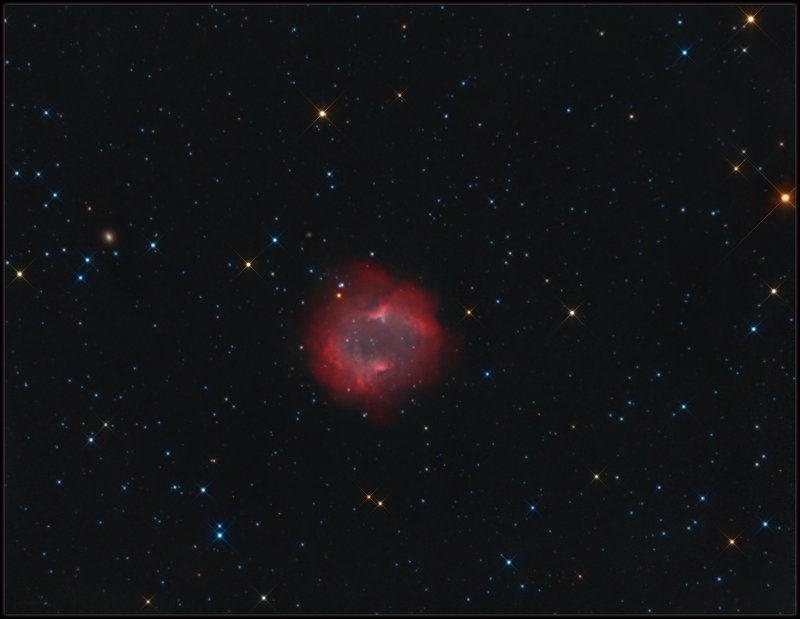
NGC 4361 Planetary nebula:
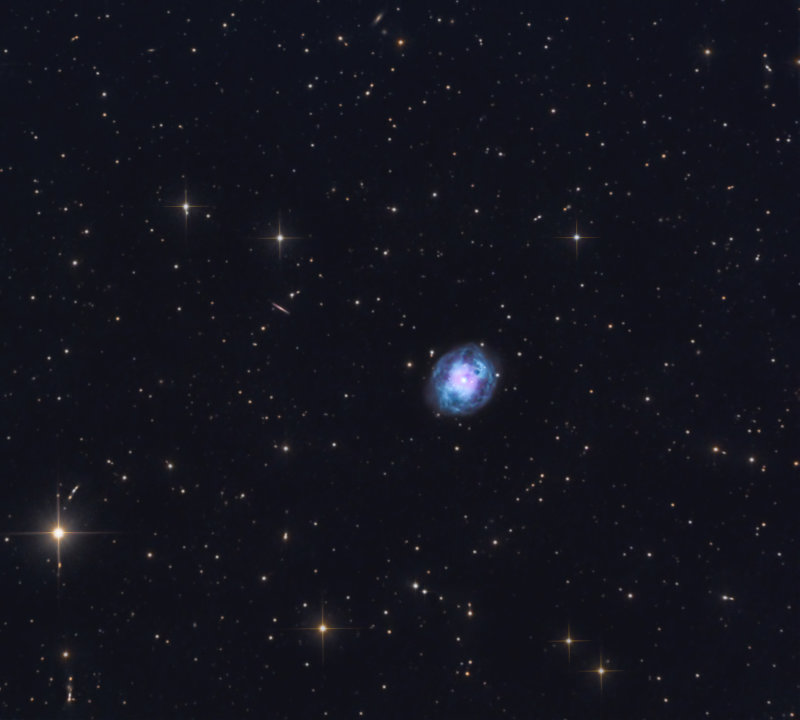
NGC 4151 & NGC 4145 galaxies:
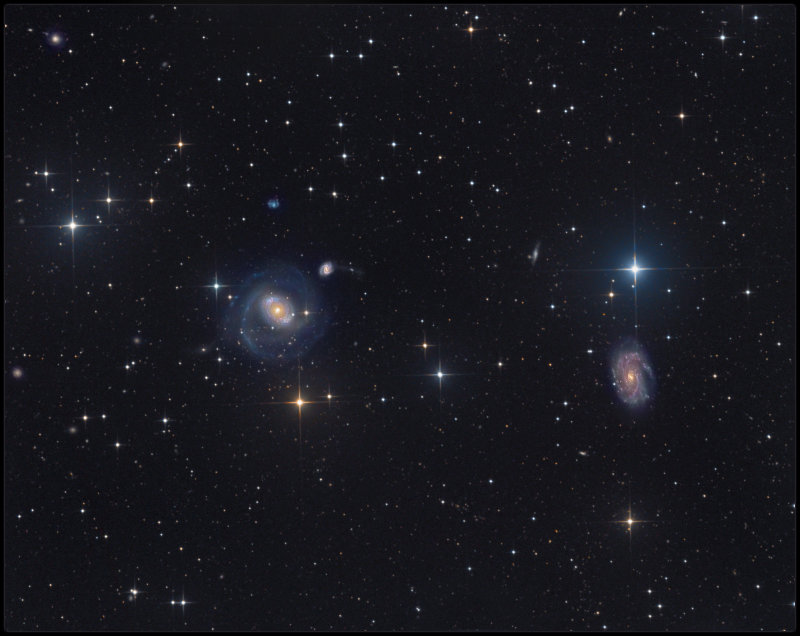
A starless milky way over Wyoming - collaborated with B. W. Gustafson:
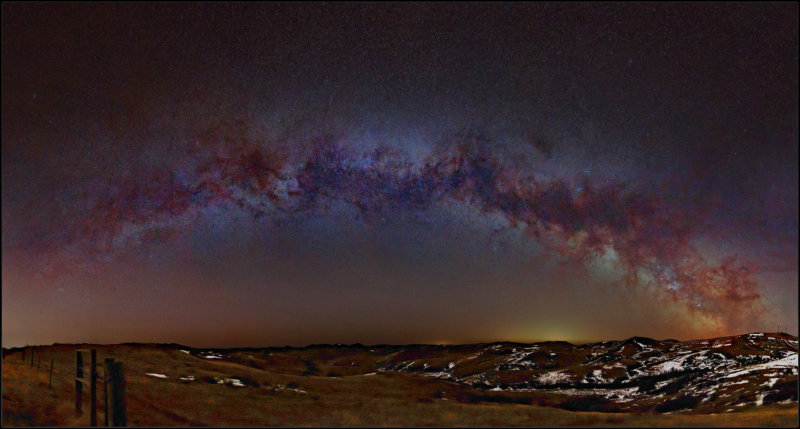
Here are a few new images.
Larger versions and details:
https://pbase.com/tango33/new_images
All the best,
Kfir Simon
Abell 24 Planetary nebula:

NGC 4361 Planetary nebula:

NGC 4151 & NGC 4145 galaxies:

A starless milky way over Wyoming - collaborated with B. W. Gustafson:

-
mdieterich
- Science Officer
- Posts: 100
- Joined: Fri Feb 13, 2015 5:50 pm
Re: Submissions: 2021 April
Thin Blue Line
www.mattdieterich.com
Copyright: Matt Dieterich While flying down to Chile I was setup in the airplane shooting a timelapse of the night sky. After stopping the timelapse I captured this single frame of the thin blue line we live in from 35,000 ft up.
www.mattdieterich.com
Copyright: Matt Dieterich While flying down to Chile I was setup in the airplane shooting a timelapse of the night sky. After stopping the timelapse I captured this single frame of the thin blue line we live in from 35,000 ft up.
- Robin_Onderka
- Ensign
- Posts: 47
- Joined: Sat Mar 07, 2020 6:54 pm
Re: Submissions: 2021 April
Milky Way with Jupiter and Saturn
Credits: Robin Onderka | www.instagram.com/robin_onderka
What are these 2 bright bulbs above the tree? Last year, you could observe beautiful Saturn (smaller) and Jupiter (bigger) close to the Milky Way core.
Enjoy the view of our beautiful Czech land with Slovak mountains in the background. After month of cloudy nights, we had a clear night with lots of fog in the lowlands blocking significant ammount of light pollution. You can still see few clouds passing by before they overflow the whole sky again
6D mod + Sigma 35/1.4
Location: Staré Hamry, Czech Republic
small panorama, each panel has 3 stacked pictures for noise reduction and 1 longer exposure for the foreground. Out of tripod
Sky: 3x13" f/2.2 ISO 6400
Ground: 1x30" f/2.2 ISO 6400
 Milky Way with Jupiter and Saturn by Robin Onderka, on Flickr
Milky Way with Jupiter and Saturn by Robin Onderka, on Flickr
Credits: Robin Onderka | www.instagram.com/robin_onderka
What are these 2 bright bulbs above the tree? Last year, you could observe beautiful Saturn (smaller) and Jupiter (bigger) close to the Milky Way core.
Enjoy the view of our beautiful Czech land with Slovak mountains in the background. After month of cloudy nights, we had a clear night with lots of fog in the lowlands blocking significant ammount of light pollution. You can still see few clouds passing by before they overflow the whole sky again
6D mod + Sigma 35/1.4
Location: Staré Hamry, Czech Republic
small panorama, each panel has 3 stacked pictures for noise reduction and 1 longer exposure for the foreground. Out of tripod
Sky: 3x13" f/2.2 ISO 6400
Ground: 1x30" f/2.2 ISO 6400
 Milky Way with Jupiter and Saturn by Robin Onderka, on Flickr
Milky Way with Jupiter and Saturn by Robin Onderka, on Flickr
Last edited by Robin_Onderka on Sat Apr 03, 2021 7:39 am, edited 1 time in total.
-
Thabet_UAE
Re: Submissions: 2021 April
Image: Seagull Nebula/ IC2177 in false SHO colors. While original colors of this object is mostly red, I have found a different editing process that allowed to show the different elements by switching channels.
52x300 secs
Scope/Lens: William Optics RedCat 51
Camera: Canon EOS Ra,
Filter: L-eXtreme
Mount: Fornax Lighttrack ii
Location: AL Sadeem Observatory, Abu Dhabi, UAE
 Seagull in false SHO by Thabet Al Qaissieh, on Flickr
Seagull in false SHO by Thabet Al Qaissieh, on Flickr
52x300 secs
Scope/Lens: William Optics RedCat 51
Camera: Canon EOS Ra,
Filter: L-eXtreme
Mount: Fornax Lighttrack ii
Location: AL Sadeem Observatory, Abu Dhabi, UAE
 Seagull in false SHO by Thabet Al Qaissieh, on Flickr
Seagull in false SHO by Thabet Al Qaissieh, on FlickrRe: Submissions: 2021 April

https://yann-sainty.com/cygnus_APOD.png
Sigma ART 135mm open to F3.5
Asi 2600 mc pro
Guidance: zwo miniguide + asi120mm mini
EQ6R PRO
NINA + PHD2
Siril + Pix + PS + Topaz
The full is here, do not hesitate to go see it we can zoom in a little to see the details: https://www.astrobin.com/knyu0m/0/
Credit : Yann SAINTY
France
Last edited by bystander on Sat Apr 03, 2021 4:21 pm, edited 1 time in total.
Reason: Please, no hot links to images > 500KB. Substituted smaller image,
Reason: Please, no hot links to images > 500KB. Substituted smaller image,
-
Paulee97
- Ensign
- Posts: 41
- Joined: Thu Sep 22, 2016 4:18 pm
- AKA: Paulee
- Location: Brno, Czech Republic
- Contact:
Re: Submissions: 2021 April

Comet C/2020 F3 Neowise over Žalostinná Copyright: Pavel Váňa
July of 2020 was the month when we forgot anything about SARS-COV 2019 because of this beaufitul comet. Every astronomer living in north hemisphere on Earth was travelling to his favorite spot to capture these beautiful moments.
That year I found a beautiful spot near my home which is called Žalostinná which is located in Slovakia near Czech borders.
21st July 2020 - that night had some magical spirit. Air was so clean, but in the long distance there were some thunderstorms so we saw flashes from lightning over sky, maybe thanks to these storms you can see some beautiful structures of airglow.
Pano was made of 40 single shots each was exposed for 13 seconds with ISO 4000, Canon EOS 6D mod., Sigma Art 24 mm f/1.4@2.2.
Re: Submissions: 2021 April
Aristoteles and Eudoxus craters are located on the Southern edge of the Luna Mare Frigoris - The Sea of Cold, which in terms of Mare descriptive Selenography is somewhat vaguely defined. Aristoteles lies east of the Montes Alpes and to the north of the Montes Caucasus which are at the foot of the image. It is an impact crater of approximately 87kms in diameter with a depth of 3700.0m. Its relatively shallow depth for a crater of such diameter may indicate post impact lava flooding. Unlike most examples of complex craters the absence of any high central mountain could be an indication that such an event did occur leaving only the tops of the impactor peaks visible. The almost complete collapse of the crater South-Western wall is sharply seen in this image along with well defined terraces to the East bordering the earlier formed Mitchell crater. The South Wall of Aristoteles has also been “pushed in” by ejecta from the impactor that later produced Eudoxus crater.
Eudoxus crater is 67km in diameter and around 3.4km in depth, as with its neighbour it lacks a central peak and contains only a group of low hills scattered about the central area. The terraced structure of the walls are clearly visible.
"Cabin Crew, Seats for Landing."
Camera ASI294CM Pro mounted on a Mak-Cas 180/2700mm captured with Sharpcap, 5142 frames in SER Format @ 24/sec. stacked with AutoStakkert 3 and final processed in Photoshop.
Eudoxus crater is 67km in diameter and around 3.4km in depth, as with its neighbour it lacks a central peak and contains only a group of low hills scattered about the central area. The terraced structure of the walls are clearly visible.
"Cabin Crew, Seats for Landing."
Camera ASI294CM Pro mounted on a Mak-Cas 180/2700mm captured with Sharpcap, 5142 frames in SER Format @ 24/sec. stacked with AutoStakkert 3 and final processed in Photoshop.
Re: Submissions: 2021 April
-
Victor Lima
- Ensign
- Posts: 70
- Joined: Tue Apr 21, 2020 11:38 am
Re: Submissions: 2021 April
Water World - Iguazu Falls
The Milky Way cloud crosses the Iguazu Falls skies over the Santa Maria jump.
In this panoramic shot we can easily identify some deep sky objects characteristic of the southern hemisphere, such as the Eta Carinae nebulae, Running Chicken Nebula, Coalsack Nebula, as well as the southern cross.
It is interesting to have this view of the universe from the Iguaçu Falls, when man seeks water on other planets, perhaps thinking of a future need to abandon our planet due to the devastation caused by population growth and industries.
Canon 6Da / Canon EF 16-35mm f/2.8L II USM
4x 16mm | f/2.8| 30 sec | ISO 6400
13/03/2021
The Milky Way cloud crosses the Iguazu Falls skies over the Santa Maria jump.
In this panoramic shot we can easily identify some deep sky objects characteristic of the southern hemisphere, such as the Eta Carinae nebulae, Running Chicken Nebula, Coalsack Nebula, as well as the southern cross.
It is interesting to have this view of the universe from the Iguaçu Falls, when man seeks water on other planets, perhaps thinking of a future need to abandon our planet due to the devastation caused by population growth and industries.
Canon 6Da / Canon EF 16-35mm f/2.8L II USM
4x 16mm | f/2.8| 30 sec | ISO 6400
13/03/2021
- Robin_Onderka
- Ensign
- Posts: 47
- Joined: Sat Mar 07, 2020 6:54 pm
Re: Submissions: 2021 April
Early Milky Way in Czech Republic
Copyright: www.instagram.com/robin_onderka
---
For this photo, I had to go to the Beskydy Mountains very early in the morning (around 3AM). It shows the summer part of the Milky Way as we can see it all summer in the northern hemisphere. You can notice the remnants of snow in the surrounding countryside as a reference to this winter.
Loc: Staré Hamry, Czech Republic (part of Beskydy Mountains)
Camera: Canon 6Da
Lens: Samyang 14/2.8
6 panel panorama - 3x20" f/2.8 ISO 6400 per panel
 Early Milky Way in Czech Republic by Robin Onderka, on Flickr
Early Milky Way in Czech Republic by Robin Onderka, on Flickr
Copyright: www.instagram.com/robin_onderka
---
For this photo, I had to go to the Beskydy Mountains very early in the morning (around 3AM). It shows the summer part of the Milky Way as we can see it all summer in the northern hemisphere. You can notice the remnants of snow in the surrounding countryside as a reference to this winter.
Loc: Staré Hamry, Czech Republic (part of Beskydy Mountains)
Camera: Canon 6Da
Lens: Samyang 14/2.8
6 panel panorama - 3x20" f/2.8 ISO 6400 per panel
 Early Milky Way in Czech Republic by Robin Onderka, on Flickr
Early Milky Way in Czech Republic by Robin Onderka, on FlickrRe: Submissions: 2021 April
The Continent & the Bird
Copyrights: Nicolas Rolland & Terry Hancock
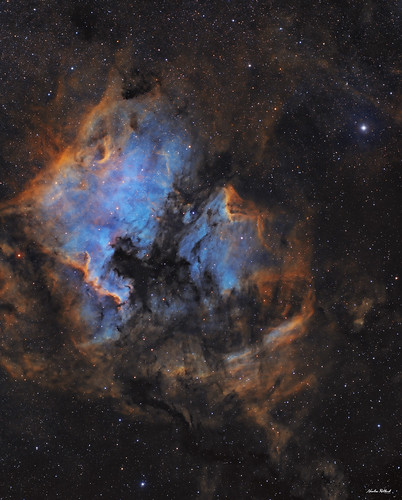
The Continent & the Bird by Nicolas Rolland, sur Flickr
Full resolution here
RA: 20h 52m 49.9s
DEC: +43° 56’ 14"
Size: 4.8 x 5.98 deg
Orientation: Up is 3.53 degrees E of N
Location: Cygnus
Distance: 2.6 kly
Magnitude: 4
Acquisition May-June 2020
Total acquisition time of 21 hours.
Copyrights: Nicolas Rolland & Terry Hancock

The Continent & the Bird by Nicolas Rolland, sur Flickr
Full resolution here
RA: 20h 52m 49.9s
DEC: +43° 56’ 14"
Size: 4.8 x 5.98 deg
Orientation: Up is 3.53 degrees E of N
Location: Cygnus
Distance: 2.6 kly
Magnitude: 4
Acquisition May-June 2020
Total acquisition time of 21 hours.
Re: Submissions: 2021 April
Planetary nebula Sh2-216/LBN744/PNG158.5+00.7/PK158+00.1 (c-lsho)
http://ram.org/images/space/scope/1.4.4 ... 3m_49h.jpg Total integration: ~49 hours/2933 minutes (174 x 420s or 20.3h for Ha + 129 x 420s or 15h for O3 + 116 x 420s or 13.5h for S2).
Camera: QHY163M (16mp mono) CMOS cooled to -15 degrees C.
Telescope: Stellarvue SV70T triplet apochromat refractor @ f/4.8.
Reducer: SFFR70-APO (0.8x).
Mount: Paramount MyT.
Filters: 1.25" Astrodon 5nm Ha, 3nm O3, 3nm S2.
Software: TheSkyX Pro, SharpCap, PixInsight, Topaz Studio 2.
Inline images with reduced quality uploaded to the forum. Full resolution images are available at https://www.astrobin.com/dfmz8d/ and of the main image at http://ram.org/images/space/scope/1.4.4 ... 3m_49h.jpg
http://ram.org/images/space/scope/1.4.4 ... 3m_49h.jpg Total integration: ~49 hours/2933 minutes (174 x 420s or 20.3h for Ha + 129 x 420s or 15h for O3 + 116 x 420s or 13.5h for S2).
Camera: QHY163M (16mp mono) CMOS cooled to -15 degrees C.
Telescope: Stellarvue SV70T triplet apochromat refractor @ f/4.8.
Reducer: SFFR70-APO (0.8x).
Mount: Paramount MyT.
Filters: 1.25" Astrodon 5nm Ha, 3nm O3, 3nm S2.
Software: TheSkyX Pro, SharpCap, PixInsight, Topaz Studio 2.
Inline images with reduced quality uploaded to the forum. Full resolution images are available at https://www.astrobin.com/dfmz8d/ and of the main image at http://ram.org/images/space/scope/1.4.4 ... 3m_49h.jpg
- AlessandroCantarelli
- Ensign
- Posts: 21
- Joined: Fri May 05, 2017 8:41 am
Re: Submissions: 2021 April
Matterhorn
360°panoramic view (crop around 270°) consisting of 4 shots + one for the high lights; from the left: the Gorner Observatory, Monte Rosa, Mars, Breithorn, Saturn, Jupiter, the Moon, the Matterhorn and below the Gorner glacier.
Sony A6600 + Samyang 8mm f2.8 FisheyeI thought about the title, then, the photoshop project and the backup folder were called Matterhorn, the name across the border to define the Matterhorn and nothing... That was fine.The name of this mountain is epic, but even more epic is its view from Zermatt, the beautiful Swiss town from which the little train that ends at the Gorner Observatory departs.As soon as you see the Matterhorn appear, you immediately realize that you are faced with something to which you must pay much, much respect, as every element of nature deserves, especially the great mountains that have written the history of mountaineering. 4478 meters of magic.
When I arrived at the Gornergrat I realized that the Matterhorn was just one of the incredible elements that characterize this area, the area is beautiful, the glacier that descends from the ridge of Monte Rosa, the alpine lakes, the atmosphere there is unique.Definitely one of the most beautiful stages of the 30 days spent in Switzerland, wonderful land that has changed a lot my way of seeing life.the 11.302px long side file is perfect, and it will surely end up in my room).
______________________________________
First of All
360°degrees panorama with Jupiter, Saturn, Milkyway, and an extraordinary cliff from Italy. This photo has also been awarded in many international conferences, exhibited in the Royal Museum of London. Of course, a big part of the merit is of the place.
This extraordinary location is perfect for photographing the milky way, Sardinia is one of the most beautiful islands in the world, and at night it really becomes magic.
360°panoramic view (crop around 270°) consisting of 4 shots + one for the high lights; from the left: the Gorner Observatory, Monte Rosa, Mars, Breithorn, Saturn, Jupiter, the Moon, the Matterhorn and below the Gorner glacier.
Sony A6600 + Samyang 8mm f2.8 FisheyeI thought about the title, then, the photoshop project and the backup folder were called Matterhorn, the name across the border to define the Matterhorn and nothing... That was fine.The name of this mountain is epic, but even more epic is its view from Zermatt, the beautiful Swiss town from which the little train that ends at the Gorner Observatory departs.As soon as you see the Matterhorn appear, you immediately realize that you are faced with something to which you must pay much, much respect, as every element of nature deserves, especially the great mountains that have written the history of mountaineering. 4478 meters of magic.
When I arrived at the Gornergrat I realized that the Matterhorn was just one of the incredible elements that characterize this area, the area is beautiful, the glacier that descends from the ridge of Monte Rosa, the alpine lakes, the atmosphere there is unique.Definitely one of the most beautiful stages of the 30 days spent in Switzerland, wonderful land that has changed a lot my way of seeing life.the 11.302px long side file is perfect, and it will surely end up in my room).
______________________________________
First of All
360°degrees panorama with Jupiter, Saturn, Milkyway, and an extraordinary cliff from Italy. This photo has also been awarded in many international conferences, exhibited in the Royal Museum of London. Of course, a big part of the merit is of the place.
This extraordinary location is perfect for photographing the milky way, Sardinia is one of the most beautiful islands in the world, and at night it really becomes magic.
Alessandro Cantarelli - Extreme Panoramic Landscapes
https://alexwides.com/ - https://www.instagram.com/alexwidesphotography/ - https://www.facebook.com/AlessandroCantarelliPhoto - +39 3923277373
https://alexwides.com/ - https://www.instagram.com/alexwidesphotography/ - https://www.facebook.com/AlessandroCantarelliPhoto - +39 3923277373
Re: Submissions: 2021 April

Full here : https://www.astrobin.com/full/awfgg6/0
Mosaic of 2 tiles in SHO RGB (synthetic Sii)
60x300 '' per tile for Ha and Oiii with IDAS NBZ
90x60 '' per tile with IDAS P3
Asi 2600mc pro gain 100 offset 50 cooled to -10 ° C
Sigma ART 135mm open to F3.5
Eq6R pro
Guide zwo miniscope with asi 120mm mini
Acquisition: Nina / PHD 2
Processing: Siril / PixInsight / PS
Copyright Yann SAINTY
France
Last edited by YSTY on Wed Apr 07, 2021 7:20 am, edited 2 times in total.
-
Yovin Yahathugoda
- Ensign
- Posts: 21
- Joined: Tue Feb 09, 2021 2:56 pm
Re: Submissions: 2021 April
Horsehead Nebula & Flame Nebula in HOO
https://www.astrobin.com/users/YovinRY/
Copyright: Yovin Yahathugoda
Full quality version here: https://cdn.astrobin.com/images/86236/2 ... ba4d43.jpg
The image was processed in the HOO palette with a synthetic luminance layer created by combining Ha and SII.
Telescope - Takahashi FSQ-106 EDX4
Camera: FLI PL16803
Filters: Astrodon Ha 3nm, Astrodon OIII 3nm, Astrodon SII 3nm
Software: Photoshop 2020, PixInsight & Topaz Denoise AI
Location - IC Astronomy Observatory, Spain
Dates - 10/03/2021 , 13/03/2021 , 14/03/2021
Lum - Synthetic Luminance
Halpha - 8x300s
OIII - 8x300s
SII - 9x300s
Total Exposure time - 2.1 hours
Full acquisition details at https://www.astrobin.com/dcqb9k/0/
https://www.astrobin.com/users/YovinRY/
Copyright: Yovin Yahathugoda
Full quality version here: https://cdn.astrobin.com/images/86236/2 ... ba4d43.jpg
The image was processed in the HOO palette with a synthetic luminance layer created by combining Ha and SII.
Telescope - Takahashi FSQ-106 EDX4
Camera: FLI PL16803
Filters: Astrodon Ha 3nm, Astrodon OIII 3nm, Astrodon SII 3nm
Software: Photoshop 2020, PixInsight & Topaz Denoise AI
Location - IC Astronomy Observatory, Spain
Dates - 10/03/2021 , 13/03/2021 , 14/03/2021
Lum - Synthetic Luminance
Halpha - 8x300s
OIII - 8x300s
SII - 9x300s
Total Exposure time - 2.1 hours
Full acquisition details at https://www.astrobin.com/dcqb9k/0/
-
Victor Lima
- Ensign
- Posts: 70
- Joined: Tue Apr 21, 2020 11:38 am
Re: Submissions: 2021 April
CATEGORY: SINGLE SHOT
SOCIAL IG: @victorlimaphoto
STORY:
Santa Maria Jump - Iguazu Falls
Photographing Iguazu Falls at night has always been one of my priority projects. For that, it was necessary to obtain a special authorization from the environmental agency responsible for national parks in Brazil. Finally, in early 2021, I got this authorization and set out to put my plan into practice.
I spent 4 days inside the Iguaçu National Park with exclusive access at night to the Falls for me and my students. The first challenge is to walk around the park at night knowing that several jaguars reside there, which are frequently seen by employees and tourists. In the area closest to the main waterfalls, the big challenge is to make long exposure images with the strong water spray from the more than 1.5 million liters per second that fall through the waterfalls. Working with exposure times longer than 10 or 15 seconds became an almost impossible task and the lens was never dry.
In this image we have one of the main waterfalls of the Iguazu Falls complex, the Santa Maria Jump. Immediately over it we can see Jupiter and Saturn and the zodiacal light illuminating the horizon. Further up there is the Milky Way Core with a level of detail and a very good density, taking into account that the capture had an exposure time of only 10 seconds. We can also identify some of the main emission nebulae present in this region of the sky.
EXIF:
Canon 6Da / Canon EF 16-35mm f/2.8L II USM
16mm | f/2.8 | 10 sec | ISO 6400
03/14/2021
SOCIAL IG: @victorlimaphoto
STORY:
Santa Maria Jump - Iguazu Falls
Photographing Iguazu Falls at night has always been one of my priority projects. For that, it was necessary to obtain a special authorization from the environmental agency responsible for national parks in Brazil. Finally, in early 2021, I got this authorization and set out to put my plan into practice.
I spent 4 days inside the Iguaçu National Park with exclusive access at night to the Falls for me and my students. The first challenge is to walk around the park at night knowing that several jaguars reside there, which are frequently seen by employees and tourists. In the area closest to the main waterfalls, the big challenge is to make long exposure images with the strong water spray from the more than 1.5 million liters per second that fall through the waterfalls. Working with exposure times longer than 10 or 15 seconds became an almost impossible task and the lens was never dry.
In this image we have one of the main waterfalls of the Iguazu Falls complex, the Santa Maria Jump. Immediately over it we can see Jupiter and Saturn and the zodiacal light illuminating the horizon. Further up there is the Milky Way Core with a level of detail and a very good density, taking into account that the capture had an exposure time of only 10 seconds. We can also identify some of the main emission nebulae present in this region of the sky.
EXIF:
Canon 6Da / Canon EF 16-35mm f/2.8L II USM
16mm | f/2.8 | 10 sec | ISO 6400
03/14/2021
VdB30 in Camelopardis
March 2020/March 2021
Location: San Romualdo - Ravenna (Italy)
Tecnosky AG 70/350 - CCD QSI 583ws cooled -20
ASA DDM60PRO for red and green - Unguided images
Avalon M1 - Celestron OAG - QHY5III 174M for Blu and H-alpha
Astrodon RGB Gen2 E-series and Narrowband 3nm filters
HA-RGB: HA 22x10min Bin2, R 30x7min, G 30x7min, B 30x7min.
Acquired: MaximDL5 - Calibrated with Dark, Bias and Flat
Processed: MaximDL5, Astroart6, Paint Shop Pro2020, plug-in Topaz and Nik
Cristina Cellini
Location: San Romualdo - Ravenna (Italy)
Tecnosky AG 70/350 - CCD QSI 583ws cooled -20
ASA DDM60PRO for red and green - Unguided images
Avalon M1 - Celestron OAG - QHY5III 174M for Blu and H-alpha
Astrodon RGB Gen2 E-series and Narrowband 3nm filters
HA-RGB: HA 22x10min Bin2, R 30x7min, G 30x7min, B 30x7min.
Acquired: MaximDL5 - Calibrated with Dark, Bias and Flat
Processed: MaximDL5, Astroart6, Paint Shop Pro2020, plug-in Topaz and Nik
Cristina Cellini
- PierandreaFolle
- Ensign
- Posts: 23
- Joined: Thu Mar 05, 2020 4:16 pm
Re: Submissions: 2021 April
Stellar's Gathering
Do you know that even the stars made some gathering in Covid time?
Last month conjuction of Mars and Plaiades, shot on 8 March with a non modified Nikon D850 for 20 minutes integration for sky at 300mm.
The final shot was mixed with two different light painting's techniques and a human figure photo.
The location was in south Italy, Porto Selvaggio Bay.
Sky
8x150s f/5.6 ISO 640 @300mm
Foreground
3x270s f/5.6 ISO 1250 @14mm
Lightpainting
60s f/5.6 ISO 1250 + 30s f/5.6 ISO 1250
Girl
11s f/11 ISO 3200
Copyright: Pierandrea Folle
Star's Gathering by Pierandrea Folle, su Flickr
Do you know that even the stars made some gathering in Covid time?
Last month conjuction of Mars and Plaiades, shot on 8 March with a non modified Nikon D850 for 20 minutes integration for sky at 300mm.
The final shot was mixed with two different light painting's techniques and a human figure photo.
The location was in south Italy, Porto Selvaggio Bay.
Sky
8x150s f/5.6 ISO 640 @300mm
Foreground
3x270s f/5.6 ISO 1250 @14mm
Lightpainting
60s f/5.6 ISO 1250 + 30s f/5.6 ISO 1250
Girl
11s f/11 ISO 3200
Copyright: Pierandrea Folle
Star's Gathering by Pierandrea Folle, su Flickr
-
Riccardofiuco
- Ensign
- Posts: 12
- Joined: Sat Sep 17, 2016 1:34 pm
- AKA: Riccardo Crescimbeni
Re: Submissions: 2021 April
HICKSON 44
The four prominent galaxies seen in this field are one of the groups called Hickson ... in this case Hickson 44, about 100 million light-years away from the constellation Leo. The two spiral galaxies in the center of the image are edge-to-edge NGC 3190 with its distinctive warped dust alleys and S-shaped NGC 3187. Together with the luminous elliptical, NGC 3193 on the right, they are also known as Arp 316 The spiral in the upper left corner is NGC 3185, the fourth member of the Hickson group. Like other galaxies in the Hickson groups, these show signs of distortion and enhanced star formation, evidence of a gravitational tug-of-war that will eventually result in galaxy mergers on a cosmic time scale. The merging process is now understood to be a normal part of the evolution of galaxies, including our own Milky Way. For the scale, NGC 3190 is approximately 75,000 light-years in diameter at the estimated distance of Hickson 44.
ORION UK CT10 f4. 8
10micron GM2000 HPS
Asi294mm
Astronomik L 175X180 "BIN2
bin2 - 15 °
Astronomik RGB 60 x 120 "
From the garden of Costalpino Siena
The four prominent galaxies seen in this field are one of the groups called Hickson ... in this case Hickson 44, about 100 million light-years away from the constellation Leo. The two spiral galaxies in the center of the image are edge-to-edge NGC 3190 with its distinctive warped dust alleys and S-shaped NGC 3187. Together with the luminous elliptical, NGC 3193 on the right, they are also known as Arp 316 The spiral in the upper left corner is NGC 3185, the fourth member of the Hickson group. Like other galaxies in the Hickson groups, these show signs of distortion and enhanced star formation, evidence of a gravitational tug-of-war that will eventually result in galaxy mergers on a cosmic time scale. The merging process is now understood to be a normal part of the evolution of galaxies, including our own Milky Way. For the scale, NGC 3190 is approximately 75,000 light-years in diameter at the estimated distance of Hickson 44.
ORION UK CT10 f4. 8
10micron GM2000 HPS
Asi294mm
Astronomik L 175X180 "BIN2
bin2 - 15 °
Astronomik RGB 60 x 120 "
From the garden of Costalpino Siena
Re: Submissions: 2021 April
Ngc 4214, a dwarf irregular galaxy in Canes Venatici.
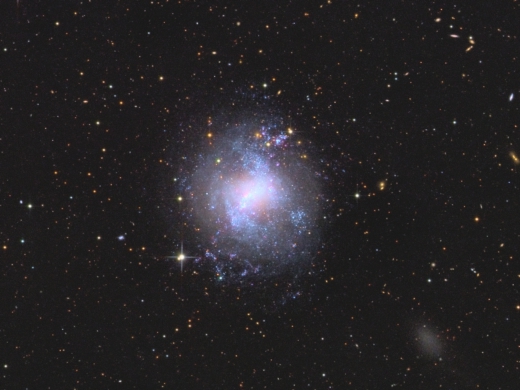
High-resolution image and technical data: http://www.javierlaina.es/IMAGENES/ngc4214.html
Javier Gómez Laina (Spain)
http://www.javierlaina.es/indexeng.html
High-resolution image and technical data: http://www.javierlaina.es/IMAGENES/ngc4214.html
Javier Gómez Laina (Spain)
http://www.javierlaina.es/indexeng.html
Last edited by javier_gl on Wed Apr 07, 2021 6:13 pm, edited 1 time in total.



